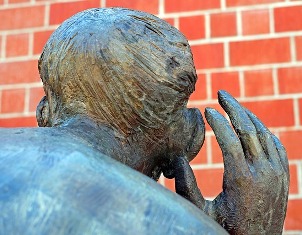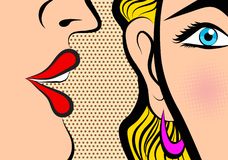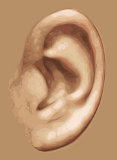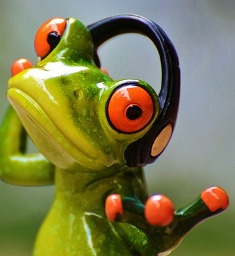Novels Need An Oral Exam
Novels Need An Oral Exam
Say AH. How do you spell that? Ah? Aaah? aaH? Would you believe it is properly written as “ah?” Though you may still write it as “aah,” that is a less common approach in novel writing. Things like this expression are often discovered in the edit phase of writing your novel, but you might be surprised to know it is often most discovered during the ORAL phase, that is, when you read your novel ALOUD.

What’s that you say? You don’t do that? Then you are short changing yourself and missing out on the most critical of all the edits, the oral. Oral readings do several things and all of them benefit both you and the reader.
First, a good novel has natural rhythm and flow to the sentences. The words in a novel flow, are varied and come and go like the tide. Sometimes words rush and sometimes they drift lazily by, the pages easy reading. Sometimes the novel swallows the reader with drama and other times creeps up like a sneaky growing tidal wave, filled with foreshadowing. An oral read through of your work lets you, and the one or ones who are listening (more on that in a moment) get a feeling of the natural undulation of your work. Too slow and the reader snoozes and drops the book. Too fast and the reader may have a hard time staying with the plot. Therefore, a good read thru provides the first actual feel of the story. When you read the words aloud you can hear and feel the advancement of your idea and decide if it has a good pace.

Second, an oral read through lets you hear the dialogue. Are your characters sounding stilted and unnatural? Do guys sound like guys? Do the YA girls sound current or more like your old mom? Getting the right dialogue is tricky and no matter how many times you read it to yourself, there is nothing like hearing it aloud. You find out if your jokes sound natural and if they are truly funny. You hear if an argument has the fury you intended or just becomes page filler. Once you hear the worlds aloud, you (and your listeners) start to know your characters. As the book progresses, so they stay true to how they began? Are the voices consistent? Do you have the right slang? Are the joikes dated or are your references out of the wrong era (or head of time)? Don’t forget to listen for the accents of your characters. Do they say “lemme” but later, “let me?” Be sure to capture the consistent. Have the listeners pretend they are listening to your audio book. You will hear all the oddities you never dreamed in your writing.
Next, the oral read through helps you define pacing. If you started out slow and are supposed to be building to a moment but suddenly drift away to a subplot, is it well-timed? Is it necessary? You can hear these things and you will miss them when you read to yourself. Things the author wants to be there may not sound correct when said aloud. Separate from the rhythm and flow, pacing tells you whether your story is hitting the marks for impact, plot and climax. Like how the words flow, the story must also flow and develop. Bumps in this area come when the reader stutters through certain parts of the oral review. You’ll hear it when it happens.

Of course, the next thing you can eliminate the repetitive or unnecessary. When you’re in the diner, do we need to know what the rest of the diner is eating while we’re having a romantic moment? Probably not. But if you’re a vampire slayer and everyone is eating raw meat, you might be in a zombie deli and be in trouble. Orals let you know whether the details matter. You may enjoy the scene when you read it to yourself, but when you read it aloud, you tend to sense whether or not you have fluff. Again, you’ll hear it. Also, you’ll hear your favorite overused words: said, but, so, maybe, just, and, and, and. In my case: smiled, turned, laughed, breathed. Look out for the adverbs too: suddenly, consequently, as a result. Remember the road to hell is paved with adverbs and readers are trusting you to take them to heaven.
In the end, maybe the most important reason to do the oral exam is because this allows you to slow down and really hear the story. Reading aloud is time consuming, yes. But it presents the novel to you in a way that no other edit will. Everything that is wrong – missing commas, overused words, odd phrasing, choppy sentences, rough dialogue – everything stands out in an oral. I tried to put in vampire parkour because my vampire loves to run the rooftops. But my story takes place in 1997 and my listener looked at that and realized that parkour didn’t happen until the 21st century. Things that look great on paper can jump out during an oral (feel unnatural or sound silly).

If you’ve finished a story or a novel, then you are ready for all those terrible edits – copy, line and developmental – but don’t forget the one that will make you dividends, the Oral. After all, an oral checkup for the writer keeps your mouth and you healthy. The oral edit, the novel checkup, makes the book strong and healthy too.
_______________________________________________________________
I just finished the oral exam of my latest book, LOVE AND BLOOD, coming in Sept 2018. God Bless my friend, Terri Wilson, who sat through nine hours on day one and five hours on day two until we finished. Lessons from that read dramatically improve my work. Now my novel is ready for its close up and sharing all its secrets.
Get your Oral Exam done today!
Thanks for stopping by.
I remain, Yours Between the Lines,
Sherry


















